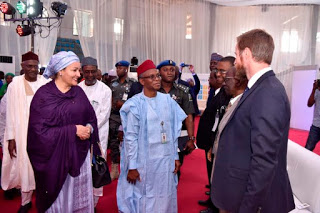News
Kaduna Makes Progress In Education, Others – El-Rufai

Governor Nasir El-Rrufai of Kaduna state has hosted the Deputy Secretary-General of the United Nations (UN), Ms Amina Mohammed, explaining that progress has been been in inherited 4,200 public primary schools in dehumanizing conditions. Governor El-Rufai with UN’ Amina Mohammed At a conference on Sustainable Development Goals (SDGs), he highlighted the progress which Kaduna State made, especially the redress of the ugly trends in schools. El-Rufai who laid foundation for the Amina Mohammed SDGs Data Lab Building said that he inherited enrollment rate stagnant at 1.1 million pupils, with at least 50 per cent of pupils taking lessons on the floor because of lack of furniture in June 2015. He his building, which is funded by the Gates Foundation, will house analytics operations to deepen the convergence and analysis of big data. El-Rufai also at the conference spoke on “Development Vision and Aspiration of Kaduna State within the context of the SDGs and the 2030’’ Prioritise
He said: “In our effort to improve teaching quality standards, the Kaduna State Universal Basic Education Board (SUBEB) had in June 2017 conducted a Primary Four competency test for teachers.” He explained that 21,780 out of 33,000 teachers that sat for competency examination failed to meet the 75% benchmark. As part of our education reform programme, we sacked the failed teachers and recruited 25,000 new teachers. “We have also expanded access to education by making the first nine years of schooling free for boys and the entire twelve years of primary and secondary education free for girls. This has led to increase in School enrolment from 1.1 million to 2.1 million almost doubling the number of pupils in the State. In his tweet on Tuesday, El-Rufai said, “After a review of the cost and analysis of the demographic trends data as it relates to overcrowding in the classrooms, we decided to build multi-storey school blocks with more classrooms to accommodate 30 to 40 pupils per class.’’ “By January 2017, about 500 of the schools had been rehabilitated at the cost of about N6 billion. “Our investments have contributed to the total overhauling of the education sector. We have introduced a Schools Rehabilitation Programme to provide decent classrooms, furniture, water and toilet facilities
.’’ He said that the state has invested in human resources in the health sector by employing 70 doctors and 1,160 Nurses whilst improving our Secondary and Tertiary health Institutions. “Through findings from our Annual Health Facility Census, we are investing in 255 primary healthcare Centres (PHCs) – one functional PHC per political ward. This is to reduce the incidence of under-5 mortality and maternal mortality rates by almost 50%. “In Kachia Local Government Area, government has invested in the grazing reserves and about 30,000 youths have been supported with funds to cultivate beans for export. “It is equally providing training and support for commercial farming. In Kubau Local Government Area, 5,000 youths have been supported to cultivate maize, rice and beans for local consumption and export. “To boost food production, the Kaduna State government has made substantial investment in the agriculture sector, including investment in easing the supply of crucial inputs. “However, the volatility of incomes and food production coupled with weak social protection and insurance systems have left many households vulnerable to food insecurity, at least on a seasonal basis. “Our poverty alleviation strategy is driven by knowledge from the Kaduna State GDP & Agricultural Surveys. Agriculture constitutes 36.75% of Kaduna’s economy (KDGDP 2017). About 42.6% of the workforce is employed in agriculture (KASS 2017) producing 22% of the country’s maize,’’ he said, “We believe that evidence-based data improves our decision-making process by indicating which outcomes are more realistic and how much is required to fund the programmes that ensure that no one is left behind. “We have made progress by adopting the SDGs targets and indicators, investing in data that allows us to know where we are coming from and what we have achieved so far. “Kaduna State stands out as a pace-setter in the implementation of the Sustainable Development Goals (SDGs). We made history as first state in Nigeria to present an in-depth analysis of its SDGs data and strategy for implementation at the 72nd United Nations General Assembly.’’ The state, he said, was developing integrated and sustainable Infrastructure that would make Kaduna State a leading investment destination in Nigeria. The state was also focusing on exploiting “our comparative advantage’’ to drive the revamping of the industrial sector, to make our state globally competitive. The Kaduna State Development Plan, which is aligned to the SDGs, is geared towards achieving Social Outcomes by delivering jobs, social security and prosperity. The infrastructure master plan and industrial plans, he said, were geared towards achieving Economic outcomes through: “We have prioritized domesticating and localizing the Sustainable Development Goals (SDGs). Sustainable environment needs religious bodies’ partnership — Stakeholders “We are benchmarking our progress towards meeting the 2030 agenda as the fastest approach to ensuring that we tackle the issues of poverty and human capital development in Kaduna State. “Our commitment to promoting equal opportunity has guided our programmes in government. And these align with the 17 commitments outlined in the SDGs which advance the goal of ensuring that “No one is left behind”. “Given the imperative to enhance the living conditions of most of our people, Kaduna State and Nigeria need to ramp the attainment of the fundamental targets and indicators that are encapsulated in the SDGs.’’ Related


















